- Home
- Lucy Felthouse
The Persecution of the Wolves
The Persecution of the Wolves Read online
The Persecution of the Wolves
By Lucy Felthouse
Text Copyright 2021 © Lucy Felthouse.
All Rights Reserved.
Smashwords edition.
With the exception of quotes used in reviews, this book may not be reproduced or used in whole or in part by any means existing without written permission from the aforementioned author.
Warning: The unauthorised reproduction or distribution of this copyrighted work is illegal. No part of this book may be scanned, uploaded or distributed via the Internet or any other means, electronic or print, without the author’s written permission.
This book is a work of fiction and any resemblance to persons, living or dead is purely coincidental. The characters are productions of the author’s imagination and used fictitiously.
Table of Contents
Author’s Note
Chapter One
Chapter Two
Chapter Three
Chapter Four
Chapter Five
Chapter Six
Chapter Seven
Chapter Eight
Chapter Nine
Chapter Ten
Chapter Eleven
Chapter Twelve
Chapter Thirteen
Chapter Fourteen
Chapter Fifteen
Chapter Sixteen
Chapter Seventeen
Chapter Eighteen
Chapter Nineteen
Chapter Twenty
Chapter Twenty-one
Chapter Twenty-two
Chapter Twenty-three
Chapter Twenty-four
Chapter Twenty-five
Chapter Twenty-six
Chapter Twenty-seven
Chapter Twenty-eight
Chapter Twenty-nine
Chapter Thirty
Chapter Thirty-one
Chapter Thirty-two
Chapter Thirty-three
Chapter Thirty-four
Chapter Thirty-five
Epilogue
Addendum
About the Author
If You Enjoyed The Persecution of the Wolves
Author’s Note
The history of the plague in Eyam is a fascinating one, full of almost unbelievable self-sacrifice, which seems even more poignant in recent times. If you’d like to find out more about the true events that inspired this story, please see the addendum at the end of the book.
Chapter One
Modern day Eyam
As Matthew and Isaac Adams stepped through the front door to their house, the telephone started ringing. Matthew sighed. “Typical. No rest for the wicked. I’ll answer it—you go and get ready for work.”
Isaac nodded and headed off to do as his brother advised. Matthew, the older of the two, walked up to the ringing phone and snatched it off the hook. Then, remembering the person on the other end of the line would have no idea what a rough night he’d just had, he made the effort to inject some politeness into his tone.
“Hello? Adams residence.” Isaac had told him time and time again the last part about the residence was old fashioned, that people didn’t say that anymore, but Matthew couldn’t seem to shake it.
“Hello, Matthew? It’s Richard.” The village vicar’s voice, even though he’d only spoken four words, sounded strained, almost panicked. “You boys just get back?”
“Yes, a moment ago. Why, what’s up?”
“I, uh… I got a call. A dead sheep has been found up on the moor. Not just dead. Mutilated. Like an animal attack.”
An unpleasant feeling wormed its way under Matthew’s skin and his stomach flipped. “Oh?” He paused, then figured he had nothing to gain by not saying the next words he wanted to. “You don’t think it was us?”
The vicar’s gasp was instant, one of genuine surprise. “Lord, no! Absolutely not. I just phoned to let you know and I was wondering if you’d come up there with me and take a look? You and Isaac are probably more qualified than anyone else in the village to tell what did this.”
“Isaac has to work. He just went to get ready. But yes, I’ll come up. I’ll let my brother know where I’m going, then I’ll be straight over. Are you at the rectory?”
“Yes. Okay, I’ll see you soon. Thanks, Matthew. Bye.”
“Goodbye.”
Matthew hung up the phone with another sigh. The horrible feeling that had crept under his skin and taken over his gut seemed as if it was there to stay, and it was never a good sign. The vicar’s news was surprising, yes, but he also had an inkling it was going to spell trouble, or at the very least inconvenience for him and his brother.
Pulling in a deep breath in an attempt to calm his jangling nerves, Matthew walked upstairs and towards his brother’s bedroom. The door was closed. He knocked. “You decent?”
“Yeah,” Isaac replied, “close enough.”
Matthew stepped into the room and looked at his brother. He was half-dressed, almost ready for his shift at the doctors’ surgery, where he was a general practitioner. “Sorry to interrupt, mate, but that was Richard on the phone. Someone’s found a mutilated sheep up on the moor, and he’s asked me to go with him to check it out.”
Isaac paused with one arm pushed into his shirtsleeve. “He doesn’t think—”
“No. He was quite adamant about that. He just thought we’d be able to help figure out what did it. I explained you’ve got to go to work, though. I’m going to head across there now and go up with him.”
“I could phone in, let them know I’ll be late.”
Matthew held up his hand. “There’s no need, brother. Relax. Just go to work and help the sick people. I’ll let you know what—if anything—I find out.”
Isaac opened his mouth, then closed it again, apparently having thought better of whatever he was going to say. He continued to dress. “All right, I will. But make sure you let me know what happens. Send me a text or something, and I’ll phone you as soon as I have a gap in between patients.”
Matthew grimaced. He hated texting. Hated mobile phones, actually. Technology was one of the things he disliked most about modern-day life, though it was a necessary evil. It solved as many problems for him and his brother as it created, so he dealt with it as best he could. Fortunately, Isaac had always had an affinity with computers and phones, so he tutored Matthew.
“Yes, all right. I’d better go and find my phone first then, eh?”
Smirking at his brother’s rolled eyes, he left the room and headed for his own bedroom, where he thought he’d left the device the previous night before he and Isaac had headed for the caves. On spotting the mobile phone—which Isaac often made a point of telling him was akin to a brick—he grabbed it, stuffed it into his pocket, and made his way downstairs.
Retrieving his keys from the hook by the front door, he called up to his brother. “I’m going now, Isaac. I’ll see you after my shift at the pub. I’m working until closing time.”
“Okay. Don’t forget to keep me posted.”
“I won’t.” As if he could forget. The dead sheep was going to be a big thing, he just knew it. The vicar might not think he and his brother had anything to do with it, but some of the other villagers might. When there was no proof either way, just his and Isaac’s word, it was understandable, really. Since he and his brother changed into wolves every full moon, it was a natural conclusion to draw. Particularly since wolves had been extinct in England for over five hundred years.
Huffing out a breath, he left the house and crunched down the driveway to his car. He hardly used it, since he lived and worked in the village, but it was useful for shopping—the nearest large supermarket was not within walking distance—and heading up to the moor, which was about a mile and
a half out of the village up a very steep hill. Matthew could get up there with no trouble thanks to his werewolf genes, which made him much faster and fitter than the average man, but he feared the vicar, despite being only thirty-five, would find it much harder work. Time was of the essence, too. They needed to get up there, scout out the area and look for evidence before too many other people walked over it or the weather turned.
He started the engine of the four-by-four, then manoeuvred off the drive and onto the road before turning in the direction of the rectory. Eyam was so small that it took barely a minute to get there. Honking the car’s horn, Matthew waited for the vicar to come out and gave him a friendly wave when he appeared.
The clergyman, Richard Denys, waved back as he approached. Seconds later, he opened the door and clambered into the passenger seat.
“Morning,” Richard said, slamming the door shut. “I’m really sorry to have bothered you with this, especially since you only just got home.”
Shrugging, Matthew said, “It’s not a problem. I’m not working until this evening and I’m happy to help out. It’s in Isaac’s and my interests to find out who or what did this before the finger of suspicion points at us.” He turned the car around and headed back in the direction he’d come from, then after a little while, indicated right.
“I hate to say it, but it is a possibility. You know you have my full support in this. I know you and Isaac change down in the caves and have done so for years. Even if you didn’t head down there every full moon, I still wouldn’t believe you did this.”
They were now travelling up Hawkhill Road, past the village museum, then onto Edge Road, which would take them right up to the border of the moor. “Thank you, Richard. That means a lot to both of us. I just hope it doesn’t come down to whether anyone believes us or not. I hope we can find out exactly what happened and nip this thing in the bud.”
“Me too. Alex and Kevin are up there already, as they were the ones who found the sheep. They were walking the dogs before work.”
The men in question ran the village shop and post office respectively, and Matthew was conscious they would need to leave soon to open up their businesses for the day. “Okay, no worries. They can head off as soon as we get there.”
“That’s the plan.”
“Excellent.” If only it was, he thought. Today was going to be as far from excellent as it was possible to be. The best-case scenario would be to discover a fox or some other predator had mauled the sheep, and that still left the unfortunate farmer with a dead sheep. The worst-case scenario really didn’t bear thinking about.
They sat in silence for the few minutes it took to get to the side road at the edge of the moor, and Matthew parked up on the verge. Both men jumped out of the vehicle and headed for the pair of entrances to the area. “Whereabouts are they?” Matthew asked, pausing next to the stile set into the drystone wall.
Richard pointed off to the right. “Along the path toward Hazelford, where the sheep sometimes graze on the moor…” He trailed off. “But you already know that. Sorry, Matthew. I’m telling you stuff you know a lot more about than I do.”
“It’s all right, don’t worry. Come on, let’s go.” With that, he strode towards the gate. There was a very small patch of grass before the area transformed into full-on, heather-covered land that was almost inaccessible in places. The stone circle on the moor, Wet Withens, was a total pain in the backside to get to because of all the foliage, much to the disappointment of villagers and tourists alike. Matthew and Isaac, of course, having lived in the village for over four hundred years, had visited the circle many times, before the undergrowth was even there. It had been used as one of the supply drop-off points during the plague of 1665.
As he passed through the gate and stepped onto the grassy area, Matthew’s mood took a further dip as thoughts flew through his mind. The fourteen months that the bubonic plague, or Black Death, had been in Eyam had been the worst of his life. He’d still been a policeman at the time, and because he and Isaac had been in no danger of contracting the disease, they had done everything they could to help out—tending to the sick, digging graves, burying the dead, heading out to the boundary markers to pick up supplies and leave payment, and much more. They had changed up on the moor then, as it had been long before they’d realised the mine and cave system which ran under Eyam Dale would serve their purposes better. As part of the agreement they’d had with the villagers—who had discovered their true nature several years previously—they’d seen off any predators which threatened the livestock. And because when they changed they were aware of their actions and could remember them afterwards, they’d known not to harm the farm animals themselves. So there was no reason for the villagers to think he and Isaac would start slaughtering sheep now.
But doubt was a powerful thing. It didn’t help that the sheep had been found so near to the anniversary of the plague outbreak, which understandably made the villagers more sensitive. Just the previous day, the annual service had been held in Cucklett Delph, honouring the long-deceased villagers and their bravery.
Pushing thoughts of the plague and doubting villagers from his mind, Matthew continued along the path with Richard in tow. He had to deliberately slow down so as not to leave the vicar behind. In an attempt to lift his mood, he took the opportunity to soak up the sights, sounds, and smells around him. The sun was up and rapidly warming the air and ground, chasing away the dew. Birds, mercifully unaware of what had unfolded, tweeted and sang and went about their business. The area itself was as stunningly beautiful as always. The plant life was plentiful in shades of purple, green and brown, and the views were both panoramic and dramatic. A much-needed feeling of warmth seeped into his bones and made him think perhaps things weren’t so bad after all.
Unfortunately, his respite was short-lived, as before long the lovely scents of nature that had filled his nostrils were replaced by something utterly repugnant—the smell of rotting flesh. It was one he’d experienced far too many times in his long life, and one he wished he’d never have to smell again. But there it was, and it told him they were close to their destination. Sure enough, a few metres further on, he caught sight of Alex and Kevin standing a little way off the path, holding on tight to their dogs’ leads. Presumably, the canines were interested in a closer look at the dead creature, and their owners were against this idea for several reasons.
Approaching the men, Matthew called out a greeting. He wanted to accompany it with a smile, but couldn’t summon up the enthusiasm. The stench by now was overwhelming to his senses, so it must have been pretty revolting to the humans too. The dogs probably had it on a par with him.
“Morning,” both men replied.
The vicar chimed in with his response, then there was an awkward moment of silence before Kevin broke it. “Sorry to call you out here so early, fellas, but I knew you’d want to see this. We came up here to walk the dogs before work and when we got close to this bit, the dogs suddenly went berserk. Good job they were on their leads, otherwise God knows what they’d have done. Oh sorry, Vicar.”
Richard rolled his eyes. “You don’t have to apologise to me every time you say ‘God,’ Kevin. I’ve told you that before.”
The older man gave a strained smile, then continued, “So, um, yeah. Here it is. We haven’t even let the farmer know yet.” He indicated a spot a few feet behind himself and Alex, and the two groups of men traded places.
“Thanks, gents,” Matthew said, giving them a nod. “We’ll take it from here—we know you have to get back down to the village to open up. I’m not working until this evening, and we all know the vicar only works one morning a week.” He grinned widely at the clergyman, who returned the gesture—it was a joke they’d had between them for years.
“All right,” Alex said, moving away and tugging hard at his dog’s lead. The creature clearly didn’t want to leave. Kevin and his dog followed suit. “Let us know what you find out, won’t you? If we’ve got ourselves some predator
s ’round here then we need to do something about it.” He looked pointedly at Matthew, who gave a tight grin.
“Isaac and I can chase off any predators if necessary, Alex. We can spread our scent about, too, to ward them off. But hopefully we won’t need to.” Now he gave a pointed look.
Alex held up his free hand in supplication. “Hey, I know you don’t like changing up here anymore, and I get it. I agree the caves are much safer—no chance of anyone accidentally seeing you there—but the sooner we get rid of this problem, the better. You know what folk can be like—if they get the idea into their heads that you and your brother might be responsible for this, it’ll be difficult to persuade them that that’s not the case.”
“I know, mate. Trust me, I want to get rid of this problem as much as you do. More, probably. And one way or another, we’ll sort it. Have no doubt of that.” Matthew realised he was practically growling the words by the end of his speech, but he didn’t care. Whatever was going on here directly affected the things he most cared about—himself, his brother, and the village. He would put a stop to it—whatever it was—if it was the last thing he did.
After a series of exchanged goodbyes, the men parted ways, Kevin and Alex and their pets heading back to the village, and Matthew and Richard turning to the carcass.
Matthew had started breathing through his mouth several minutes ago—the smell was just too overpowering. The vicar pulled his sleeve down over his hand and pressed it to his nose. The two of them surveyed the scene for a few seconds before turning to each other with confused expressions.
“What do you think?” Richard asked, his voice muffled through his hand.
“I can’t pick up any scent except for… that.” He indicated the dead sheep. “And clearly this was no natural death. Even carrion birds can’t make this much mess in such a short period of time. This was definitely a large predator. If it was a possibility, I’d say a wolf for sure, which obviously gives me cause for concern.” He paused. “It could be a fox or a badger, I suppose, but I can’t see it. This is—was—a damn big sheep.”

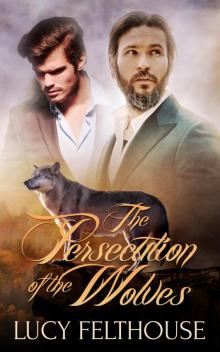 The Persecution of the Wolves
The Persecution of the Wolves Mia's Men: A Reverse Harem Romance Novel (The Heiress's Harem Book 1)
Mia's Men: A Reverse Harem Romance Novel (The Heiress's Harem Book 1) While the Boys are Away
While the Boys are Away ADifferentKindOfCosplay
ADifferentKindOfCosplay Mia's Wedding: A Reverse Harem Romance Novel (The Heiress's Harem Book 2)
Mia's Wedding: A Reverse Harem Romance Novel (The Heiress's Harem Book 2) Window Dressing
Window Dressing A French Affair
A French Affair Weekend at Wilderhope Manor
Weekend at Wilderhope Manor The Perfect Dom
The Perfect Dom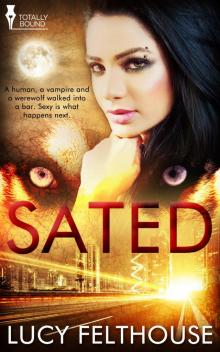 Sated
Sated The Military Wife
The Military Wife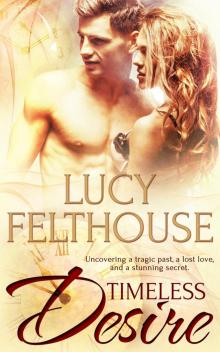 Timeless Desire
Timeless Desire Mia's Wedding_A Reverse Harem Romance Novel
Mia's Wedding_A Reverse Harem Romance Novel Girl Play
Girl Play Loose Ends
Loose Ends Mia's Wedding
Mia's Wedding Mia's Choice: A Reverse Harem Romance Novel (The Heiress's Harem Book 3)
Mia's Choice: A Reverse Harem Romance Novel (The Heiress's Harem Book 3) Mia's Men_A Reverse Harem Romance Novel
Mia's Men_A Reverse Harem Romance Novel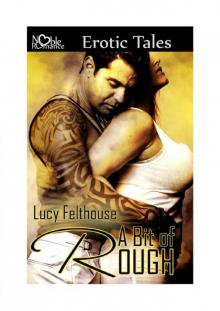 A Bit of Rough
A Bit of Rough We Love Lucy
We Love Lucy Mia's Men
Mia's Men Stately Pleasures
Stately Pleasures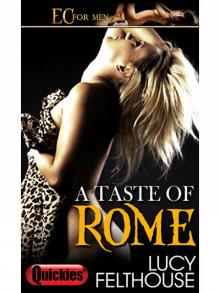 ATasteofRome
ATasteofRome The Best of Lucy Felthouse
The Best of Lucy Felthouse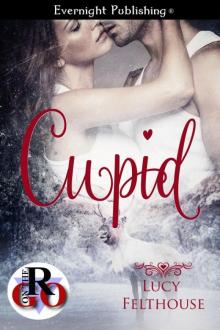 Cupid
Cupid MeanGirls
MeanGirls No Boys Allowed
No Boys Allowed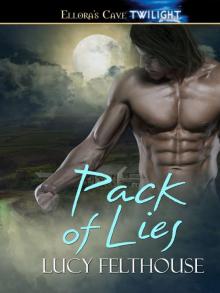 Pack of Lies
Pack of Lies Mia's Choice_A Reverse Harem Romance Novel
Mia's Choice_A Reverse Harem Romance Novel A Different Kind of Cosplay
A Different Kind of Cosplay ATasteofParis
ATasteofParis XOXO
XOXO The Sweetest Revenge
The Sweetest Revenge Red Hot Reads Two
Red Hot Reads Two Smut by the Sea
Smut by the Sea ATasteofLondon
ATasteofLondon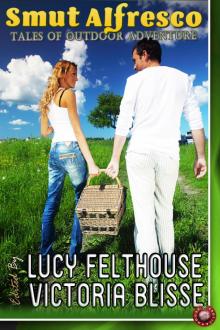 Smut Alfresco
Smut Alfresco Eyes Wide Open
Eyes Wide Open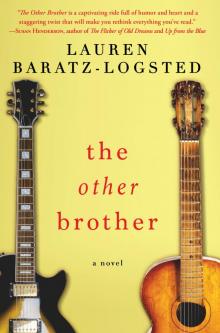 The Other Brother
The Other Brother Sweet Spot
Sweet Spot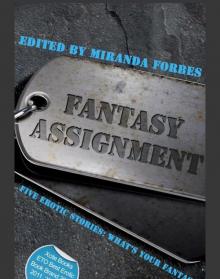 Fantasy Assignment
Fantasy Assignment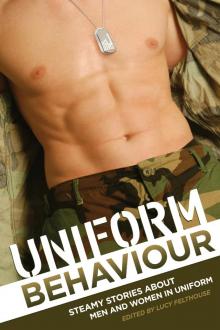 Uniform Behaviour
Uniform Behaviour Sexy Just Walked Into Town
Sexy Just Walked Into Town The Billionaire and the Wild Man
The Billionaire and the Wild Man